|
Nissan Skyline V35 /
Infiniti
G-series
Debut: 2001
Maker: Nissan
Predecessor: Skyline R34 / Laurel
|
|
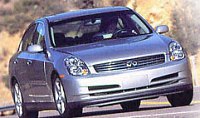 Old
Skylines Old
Skylines
It is
unbelievable that Skyline
is 45 years old now and has entered the 11th generation. As I recall
from
my childhood memory, the first Skyline I saw was the 7th generation,
sometime
around 1985. It already had those trademark quad circular taillights,
slim
body profile and RB-series inline-6 engines that characterize the later
Skyline R32, R33 and R34. These unique DNA and consistent evolution
gave
Skyline an unusual status in Japan.
New
Skyline,
or Infiniti
G35?
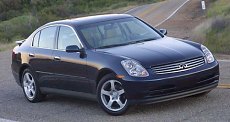 Unfortunately,
the new generation Skyline V35 (debuted in June 2001) is not a real
Skyline.
Infiniti G35 - its alternative name - is perhaps more appropriate to
reflect
its nature. In fact, when Le Cost Killer Carlos Ghosn arrived Nissan in
1998, he found the Skyline was making loss because it was not sold in
sufficient
number while sharing little parts with other models. Therefore he
decided
to combine the Skyline platform with Gloria, Cedric, Stagea (estate
version
of Skyline), 350Z and GT-R (to be split from Skyline). In this way, the
Skyline lost its unique platform and inline-6 engine. The latter is
replaced
by a more commonly used V6. Unfortunately,
the new generation Skyline V35 (debuted in June 2001) is not a real
Skyline.
Infiniti G35 - its alternative name - is perhaps more appropriate to
reflect
its nature. In fact, when Le Cost Killer Carlos Ghosn arrived Nissan in
1998, he found the Skyline was making loss because it was not sold in
sufficient
number while sharing little parts with other models. Therefore he
decided
to combine the Skyline platform with Gloria, Cedric, Stagea (estate
version
of Skyline), 350Z and GT-R (to be split from Skyline). In this way, the
Skyline lost its unique platform and inline-6 engine. The latter is
replaced
by a more commonly used V6.
Worse still is
that Ghosn
converted the Skyline into a BMW-style saloon. That is why I said
Infiniti
G35 is actually a more suitable name. Fans will never approve such
conversion,
but Ghosn cares more about money. The advantage of a BMW-style Skyline
is that it appeals to more customers and can be sold in overseas for
the
first time in its 45 years history.
For North
American market,
Nissan named it as Infiniti G35. Basically that is equivalent to the
top-of-the-range
Skyline sold in Japan. Why not simply call it Infiniti G35 in Japan?
because
Nissan never sells the brand Infiniti at home, just like Lexus never
exists
in Japan.
New styling
and packaging
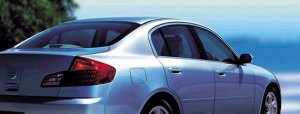 From
outside, the new Skyline looks really like a Germanic premium car,
thanks
to the smooth, fat and self-restrained profile. It looks especially
handsome
from rear quarter (see picture). Nevertheless, I am disappointed with
its
LED taillights - why not preserve the traditional quad-circular
taillights
which are far sexier? From
outside, the new Skyline looks really like a Germanic premium car,
thanks
to the smooth, fat and self-restrained profile. It looks especially
handsome
from rear quarter (see picture). Nevertheless, I am disappointed with
its
LED taillights - why not preserve the traditional quad-circular
taillights
which are far sexier?
Anyway,
the
Skyline body
functions flawlessly. It achieves an outstanding drag coefficient of
0.27
and generates just a little lift at rear. With optional aero pack, drag
even drops to 0.26 while lift is completely eliminated.
Price-wise,
the
new Skyline
competes directly with BMW 3-series. Size-wise, it runs closer to the
5-series,
having a 30mm longer wheelbase but shorter overall length. This implies
a very sporty profile with minimal overhangs.
However,
long
wheelbase seemed
fail to bring higher space efficiency, because rear cabin is still
smaller
than the 5-series, although well ahead of the cramped 3-series. That
said,
the Skyline can sit 4 in comfort but not feeling luxurious. Worse is
the
execution - the dashboard and console look so dull, the plastics,
leather
and trimming feel so cheap by German car standard, the fit and finish
doesn’t
worth the label "made in Japan". This is a typical Le Cost Killer
interior!
New engine
and
performance
Let us
concentrate on the
flagship (most powerful) Skyline 350GT and equivalent Infiniti G35. No
turbocharging anymore, they rely on a big normally aspirated V6
displacing
3.5 litres, further helped by continuous variable valve timing (VVT)
and
variable muffler. The end result is 260 horsepower (or 272hp for
Japanese
version) and 260lbft of torque, beating Acura TL Type S as the most
powerful
car in class.
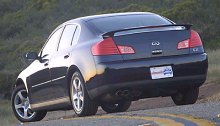 Twist
the key and you will find the new engine instantly responsive. Although
the automatic gearbox absorbs some of the power, the tremendous torque
still provide strong acceleration - 0-60mph can be done in 6.2 seconds.
Moreover, the V6 is apparently smoother and quieter than the outgoing
inline-6.
Read the spec. and you will know why - this is the well-known VQ35DE,
famous
for refinement and lightweight aluminum construction. Basically the
same
engine as those serving Altima, Maxima and 350Z, just with different
state
of tune. Twist
the key and you will find the new engine instantly responsive. Although
the automatic gearbox absorbs some of the power, the tremendous torque
still provide strong acceleration - 0-60mph can be done in 6.2 seconds.
Moreover, the V6 is apparently smoother and quieter than the outgoing
inline-6.
Read the spec. and you will know why - this is the well-known VQ35DE,
famous
for refinement and lightweight aluminum construction. Basically the
same
engine as those serving Altima, Maxima and 350Z, just with different
state
of tune.
Apart from
VQ35DE, Japanese
Skyline also offers VQ25DD and VQ30DD, displacing 2.5 and 3.0 litres
respectively.
They are even more efficient than the bigger engine, generating 212hp
and
256hp respectively, thanks to the use of direct fuel injection and
electric
continuous VVT.
However, the
best
version
of Skyline is undoubtedly 350GT-8. This Japan-only model mates the
3.5-litre
engine with a state-of-the-art Extroid CVT gearbox offering a
sequential
manual mode with 8 ratios. Yes, 8-speed, really that mad! perhaps more
than a good driver can cope with, but shifting via the steering
column-mounted
paddles like Ferrari must be tempting. The stepless automatic mode is
smooth
yet reasonably responsive. The Extroid CVT uses solid rollers instead
of
steel belt as means of transmission and ratio variation, no wonder it
handles
the torquey V6 with ease.
New chassis
and handling
One of the
benefits of switching
to V6 is better chassis balance. A V6 is much shorter than an inline-6,
so it can be positioned rearward. In addition to the long wheelbase
design,
more than half of the engine locates behind the front axle, therefore
Nissan
calls it as "front-mid engine". Besides, the lightweight of the
aluminum
VQ engine also help improving weight distribution. The end result is
52:48
front to rear, 2 points better than the old Skyline.
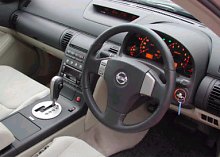 Apart
from a balanced chassis, the new Skyline has all the right ingredients
for a good sporty saloon, such as rear-wheel drive and all round
multi-link
suspensions. To improve ride quality, suspension links are even made of
forged aluminum. Apart
from a balanced chassis, the new Skyline has all the right ingredients
for a good sporty saloon, such as rear-wheel drive and all round
multi-link
suspensions. To improve ride quality, suspension links are even made of
forged aluminum.
That's the
theory. In reality,
the new Skyline never feels as sporty as it should be. Most journalists
reported good body control and high-speed stability, responsive
steering
and strong brakes. At 80% effort, the Skyline feels really like an
alternative
to BMW 3-series. However, enter twisty roads and you will find it lacks
the precise control and feeling of BMW. Its steering is too light and
oversensitive
to input, making the car harder to place accurately in tight turns. The
brakes, though powerful, is far from progressive. This works OK in
normal
driving, but once you attack corners, you will find it difficult to
apply
the exact amount of braking force you need. In BMW and Mercedes, all
controls
work in harmony with human to get the job done in style.
Worse is that
the
so-called
well-balanced chassis does not feel that way. In hard cornering, you
will
feel the car as large as it is (while a good driver's car should feel
smaller
than it is). It understeers early, refuses to corner as hard and as
accurate
as real drivers want. The use of narrow and high-profile tyres (215/55)
may be one of the reasons.
In the end,
all
road testers
agreed that the new Skyline or Infiniti G35 is not in the league of BMW
3-series, Audi A4 and Mercedes C-class. It might have the right
ingredients,
but lack of fine tuning (and perhaps some expensive critical
components)
to get the last 20 percent done. Disappointingly, while the old Skyline
spirit has lost, the new direction is not successful yet. I will miss
the
real Skyline (1957-2001) forever.
|
| The
above report was last updated on 11 July
2002. All Rights Reserved. |
Skyline Coupe / Infiniti G35 Coupe
|
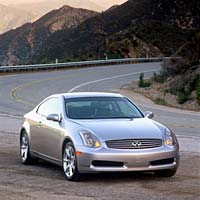 The
Coupe version of Skyline / Infiniti G35 retains the same long wheelbase
but all sheet metals were changed. Compare with the sedan, it has wider
tracks, lower roofline and the overall profile is far sleeker. The
conversion
is very successful, making it in my eyes the most beautiful mid-price
coupe
since Peugeot 406 Coupe. Attractive styling is perhaps its biggest
advantage. The
Coupe version of Skyline / Infiniti G35 retains the same long wheelbase
but all sheet metals were changed. Compare with the sedan, it has wider
tracks, lower roofline and the overall profile is far sleeker. The
conversion
is very successful, making it in my eyes the most beautiful mid-price
coupe
since Peugeot 406 Coupe. Attractive styling is perhaps its biggest
advantage.
The Coupe's
3.5
V6 is tuned
to deliver 280hp instead of the sedan's 260hp, torque is also up 10
lbft
to 270 lbft. We expected the sleeker body slip into airflow more
efficiently,
but in fact the Coupe's drag coefficient of 0.28 (with spoiler) is 0.02
up from the sedan. We also expected a lower kerb weight, but in fact
the
Coupe is 40kg heavier than the sedan despite the deletion of 2 doors
and
reduction of rear accommodation. Fortunately, it has a 6-speed manual
gearbox
from the 350Z, thus 0-60mph acceleration improves to 6.0 sec. That's
quicker
than its benchmark rival BMW 330Ci.
 Like
the V6 engine, the tuning of suspensions is mid-way between the Skyline
sedan and 350Z. It's firm without harsh. Handling is therefore sporty
without
losing comfort, although 330Ci will beat it in both aspects. Like the
sedan
and 350Z, it understeers at the limit. With optional Brembo brakes,
stopping
power is remarkable. Like
the V6 engine, the tuning of suspensions is mid-way between the Skyline
sedan and 350Z. It's firm without harsh. Handling is therefore sporty
without
losing comfort, although 330Ci will beat it in both aspects. Like the
sedan
and 350Z, it understeers at the limit. With optional Brembo brakes,
stopping
power is remarkable.
 In
terms of comfort, Skyline Coupe is not a real 4-seater like Peugeot 406
Coupe. Long wheelbase surely provide abundance of legroom to the rear
passengers,
but headroom is limited by the steeply raked rear screen like many
coupes.
We are also disappointed by the looks and feel of the interior design.
Basically, it has the same bland dashboard as the sedan, just injected
some alloy effect (actually cheap plastic panels). The sharp contrast
between
the exterior and interior styling and finish is a let down. In
terms of comfort, Skyline Coupe is not a real 4-seater like Peugeot 406
Coupe. Long wheelbase surely provide abundance of legroom to the rear
passengers,
but headroom is limited by the steeply raked rear screen like many
coupes.
We are also disappointed by the looks and feel of the interior design.
Basically, it has the same bland dashboard as the sedan, just injected
some alloy effect (actually cheap plastic panels). The sharp contrast
between
the exterior and interior styling and finish is a let down.
BMW
330Ci might
be smaller
and a little slower, but it is more exciting to drive, more refined to
travel in and more satisfying to own thanks to its premium build
quality.
Good look is not enough to persuade us switching to the Nissan
party. |
| The
above report was last updated on 10 Feb
2003. All Rights Reserved. |
|
|